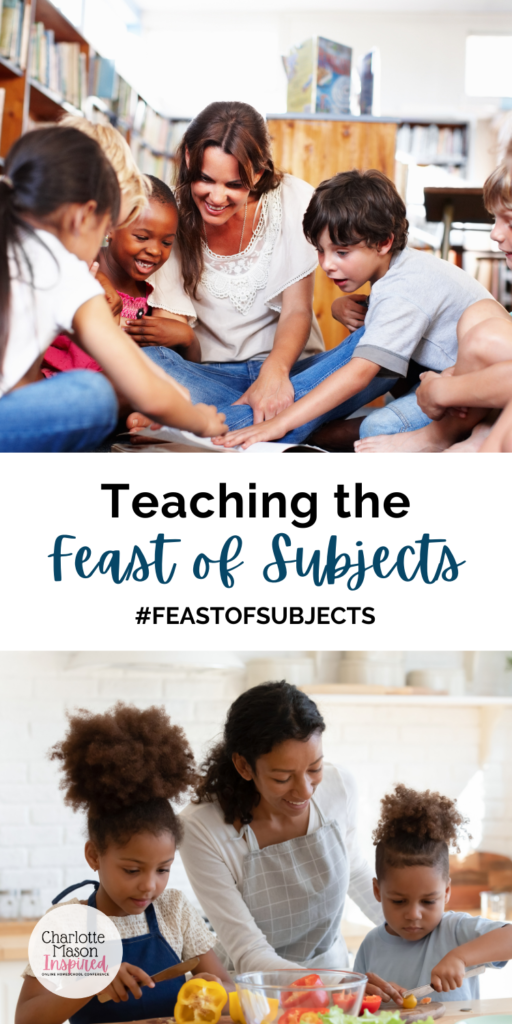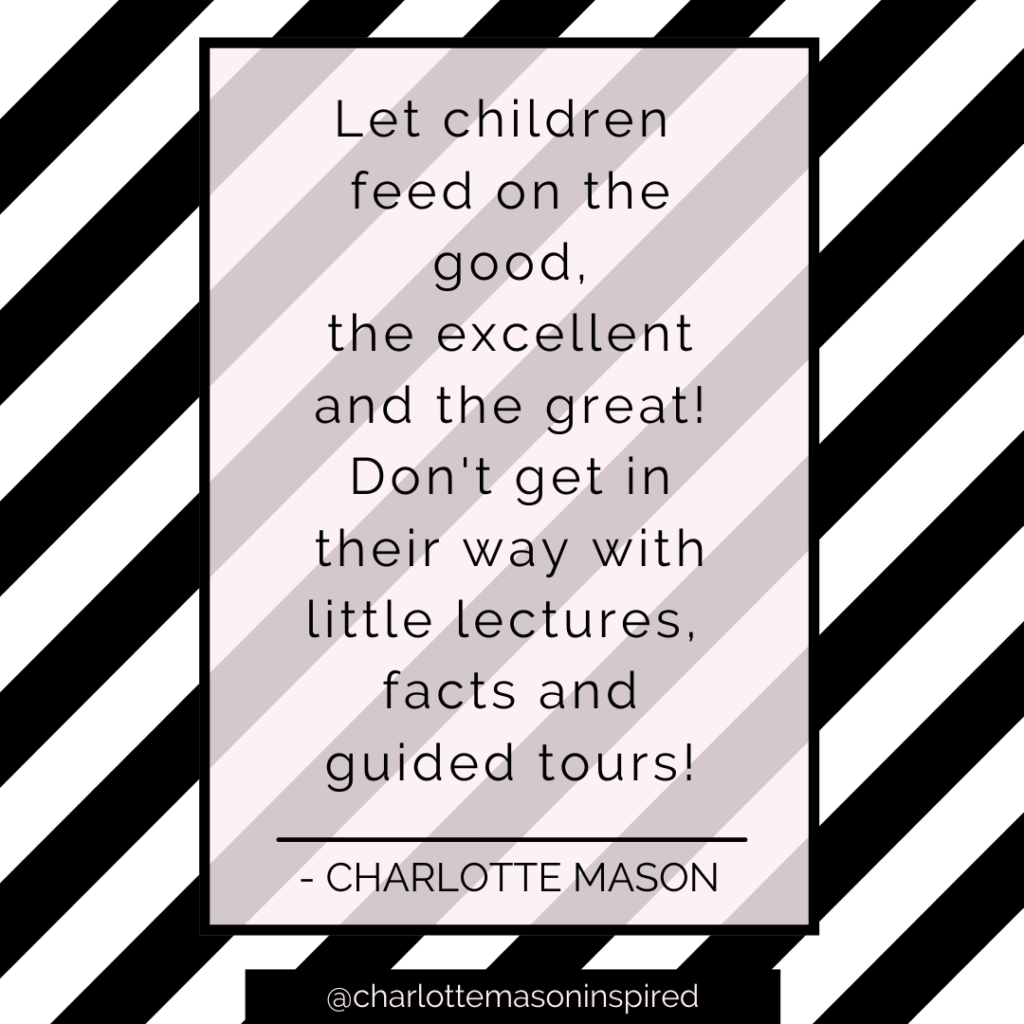Teaching the feast of subjects in a Charlotte Mason education can seem overwhelming or daunting at first, but don’t let the number of subjects intimidate you.
When I first saw the subjects taught in a Charlotte Mason education I thought um, that’s a lot of different subjects, how in the world would we ever be able to cover it all?
There’s Bible, Language Arts (which includes reading instruction, copy work, recitation, oral narration and later dictation, grammar, and written narration), History, Math, Natural Philosophy (which is the natural sciences), Geography, French (or another modern foreign language), and the Arts (drawing, handicraft, picture study, and singing).
I was drawn to the idea of a Charlotte Mason education because of the living books, nature study, and an emphasis on habits. But how do I know what to do, exactly?
The more I researched Charlotte Mason’s philosophy, the more I realized how amazing and fitting and natural are her methods.
When it comes to teaching and choosing our curriculum, there are seven principles to keep in mind.
1. ) Our child’s mind is not a blank slate.
We don’t have a bucket to fill, or a vessel to pour into. Our child is a person with a curiosity to know.
When my son was around 3 he was always asking why. “But why mommy?” “Why is the moon so big tonight?” “Why are those trees not losing their leaves?”
Kids want to learn, they want to know how something works, or why something is the way that it is. They aren’t just waiting around for us to tell them what to think (especially as they reach the teen years). They already have a wonder, a hunger for knowledge.

2.) It’s the child’s responsibility to do the learning.
It’s not for the parent to learn for our kids, they must do the work.
Oftentimes, we homeschooling parents tend to think back on our school days, which for many of us was the public school where tidbits and factoids of information were presented to us in “fun” ways. I’m sure those teachers worked very hard on their lesson plans but what do we really remember anyway.
As a homeschooling parent, especially new to the game we spend hours planning fun lessons for our kids and after the 20-minute lesson, we ask ourselves if our kids actually got anything from it.
A few years ago when my daughter was in her Kindergarten year (before I truly knew Charlotte Mason) I remember putting together this fun lesson to go with one of the books we were reading. We had read the book the day before and I started the activity and lesson with “remember in such and such book? well, here are some facts about those animals that were the main characters.”
She did not appreciate it. She resisted. This happened a few times. I would prepare something for us to do and learn alongside the book we were reading. But that approach was all wrong for us.
When I stepped out of the way and stopped telling her what to learn, things changed dramatically. She was no longer resistant and we were both enjoying school.
I love that this principle takes the stress away from me needing to prepare a certain set of information. As the teacher, it’s not my job to hand out the factoids.
3.) But it’s the teacher’s responsibility to provide a full and generous curriculum.
This is where the “feast of subjects” come into play. We want to provide many opportunities for learning. We need to present living ideas for our children to “digest.”
Even though it seems like a lot to remember to do in our homeschools, I really enjoy this about a Charlotte Mason education. I love that we are learning through stories. I love that my kids are experiencing and observing nature. We are listening to composers and looking at fine art for the pleasure of it. We are enjoying poetry and Shakespeare.
Many of these lessons are weekly and in a Charlotte Mason education, lessons are kept short. That’s what makes this so doable. It’s amazing that even with the short time spent on a lot of these subjects each week we have learned so much.
4. “Education is the Science of Relations”
What does this mean exactly? Learning is based upon the connections we make from prior knowledge and experience.
For example, my learning about desert animals will be slightly different than my daughter’s. I’ve traveled to the Southwest U.S. and have felt the dry heat of summer. I’ve seen the red clay canyons. And I’ve experienced what it’s like when a little gecko visits the back porch. My daughter only has exposure to the wooded, rolling hills, and small mountains of the Northeast (and the beaches of the Long Island Sound).
Everything is relational and connections are made based upon previous experiences and knowledge.
Understanding this we want to be able to provide valuable opportunities for our kids to learn about nature, science and art, and how to make things. When they read from their living books or encounter something in life they are making connections, they are learning!
5. A curriculum needs to be vast and varied and excellent.
Often education is referred to as a feast by Charlotte Mason. Think of a potluck dinner where everyone brings something different to the table. Or think of Thanksgiving dinner. In our family we each bring a few items so there is always so much food, there is always a lot to choose from, and it’s always so good.
Knowledge is like food. Our bodies need food to grow, our minds need knowledge to grow.
We like to eat a variety of foods to make sure we’re getting a balanced diet, and so we don’t get tired of the same old thing. This is true for knowledge as well. We need a variety to keep us balanced, interested, curious.
And finally, our diet doesn’t consist only of cookies and chocolate, in fact, sweets are consumed sparingly, if at all. Our diet needs good and healthy choices just as the material we present to our kids needs to be excellent, high quality, and well-chosen.

6. Narration is key to knowing.
Knowledge is not learned until one can communicate the knowledge by telling back or writing down. This is “narration” and is done for every reading, for every lesson in a Charlotte Mason education. You’d be surprised how helpful this becomes by the middle & high school years.
If you can tell someone about an idea or concept and be able to articulate what you know, then you really know it. Something about the way our brains are wired that this is a fabulous tool for us teachers.
Narration is not always easy at first but keep with it, your student will improve. And it probably won’t be their favorite thing to do but there are so many benefits in the long run. I tell my daughter that I wished I had learned this skill when I was in school because my memory is not quite what it used to be.
7. All children have a natural ability to focus.
Only a single reading is required, a re-reading will lessen this ability to focus and pay attention. Also, questioning our kids and summarizing for them will also inhibit this natural ability.
Kids have this amazing capacity to retain what they’re learning. Have they ever surprised you with an idea or bit of information and you stand there for a moment wondering where did you learn this?
They are watching and listening and all it takes is one time for them to get it. (That’s also why it’s so important for us moms to not repeat ourselves when asking them to do something… guilty.)
This principle of not re-reading is important because we want our kids to preserve this skill.
When kids are using their power of attention and focus it’s really quite incredible what they can learn and do.
These Charlotte Mason principles about teaching are remarkable and simple.
I treasure the freedom in teaching using Charlotte Mason methods. That through a wide and generous curriculum, I can present so many different and excellent ideas. My kids simply tell back what they are reading (which they hear or read once) and our lessons are short (to keep their attention).
I love that instead of me creating something for them to learn that they are doing the work of learning, naturally. I can see that they are making connections, and know that they are learning the skills to self educate. And isn’t that a beautiful thing?
The more I learn about Charlotte Mason and read more of her writings the more I fall in love with this method of education.
If you want to read through the Home Education series, join the book study and discover the beauty a Charlotte Mason education has to offer.

Pingback: 8 Reasons for Picture Study in Your Homeschool – Charlotte Mason Inspired